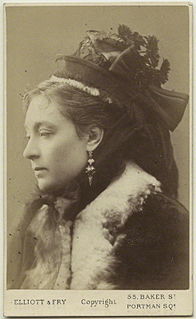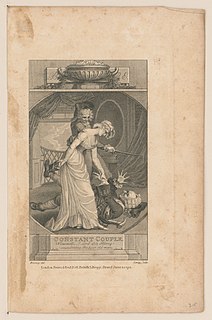Related Research Articles

Robert Baddeley (1733–1794) was an English actor. His parentage is unknown, as is his place of birth, though the latter may have been London. He worked as a cook and valet, and one of his employers was the actor-manager Samuel Foote, who may have inspired him to take to the stage. He spent three years following another employer on a Grand Tour, which helped him to develop the facility with languages and accents which was to be a hallmark of his career.
This article contains information about the literary events and publications of 1777.

Margaret Woffington, known professionally as Peg Woffington, was an Irish actress and socialite of the Georgian era. Peg and Peggy were a common pet name for those called Margaret until the late 20th century.

Sherburne is a town in Chenango County, New York, United States. The population was 4,048 at the 2010 census. The town contains two villages, one named Sherburne and the other named Earlville. The town is at the northern border of Chenango County.

Rodney Sturt Taylor was an Australian actor. He appeared in more than 50 feature films, including The Time Machine (1960), The Birds (1963), Sunday in New York (1963), 36 Hours (1965), The Glass Bottom Boat (1966), Hotel (1967), Chuka (1967), The Hell with Heroes (1968), and Zabriskie Point (1970).

Samuel Foote was a British dramatist, actor and theatre manager from Cornwall. He was known for his comedic acting and writing, and for turning the loss of a leg in a riding accident in 1766 to comedic opportunity.

The Theatre Royal Haymarket is a West End theatre on Haymarket in the City of Westminster which dates back to 1720, making it the third-oldest London playhouse still in use. Samuel Foote acquired the lease in 1747, and in 1766 he gained a royal patent to play legitimate drama in the summer months. The original building was a little further north in the same street. It has been at its current location since 1821, when it was redesigned by John Nash. It is a Grade I listed building, with a seating capacity of 888. The freehold of the theatre is owned by the Crown Estate.
Albert Horton Foote Jr. was an American playwright and screenwriter, perhaps best known for his screenplays for the 1962 film To Kill a Mockingbird, which was adapted from the 1960 novel of the same name by Harper Lee, and his original screenplay for the film Tender Mercies (1983). He was also known for his notable live television dramas during the Golden Age of Television.
The patent theatres were the theatres that were licensed to perform "spoken drama" after the Restoration of Charles II as King of England, Scotland and Ireland in 1660. Other theatres were prohibited from performing such "serious" drama, but were permitted to show comedy, pantomime or melodrama. Drama was also interspersed with singing or dancing, to prevent the whole being too serious or dramatic.
Events from the year 1720 in Great Britain.

The Good-Natur'd Man is a play written by Oliver Goldsmith in 1768. The play was written in the form of a comedy and premiered at the Covent Garden Theatre in 1768, with Mary Bulkley as Miss Richland. It was a middling success for Goldsmith, and the printed version of the play became popular with the reading public. It was released at the same time as Hugh Kelly's False Delicacy, staged at Drury Lane Theatre. The two plays went head to head, with Kelly's proving the more popular.

Maria Stanhope, Countess of Harrington, better known as Maria Foote, was a British actress and peeress in the nineteenth century.
False Delicacy is a 1768 comic play by the Irish playwright Hugh Kelly, with some assistance by David Garrick. It premiered at the Drury Lane Theatre on 23 January. The play was a major success for Kelly, being performed over twenty times during its first season and selling ten thousand printed copies within a year. It was subsequently translated into German, French and Portuguese.
The Nabob is a comedy play by the English writer Samuel Foote. It was first performed at the Haymarket Theatre on 29 June 1772. The first interpretation of the role of Mrs Matchem was made by Mrs Gardner.

Lydia Foote, born Lydia Alice Legg, was an English actress. She played leading roles from the 1850s to the 1880s, including at the Lyceum Theatre, the Olympic Theatre, the Prince of Wales's Theatre and the Adelphi Theatre. She was known for her performances in such plays as The Frozen Deep (1866) and Caste (1867).
Mr Foote's Other Leg is a 2015 stage adaptation of Mr Foote's Other Leg: Comedy, tragedy and murder in Georgian London, a 2012 biography of the 18th-century actor Samuel Foote. Both the biography and the play were written by Ian Kelly. The play's prelude is an attempt to steal Foote's amputated leg from the Hunterian Collection, but the drama mainly covers the period from Foote's tutelage under Charles Macklin in the 1740s until his involvement in the controversy surrounding Elizabeth Chudleigh in 1774–76.

The 1913 United States Senate election in Massachusetts was held during January 1913. Incumbent Republican Senator Winthrop Crane retired and was succeeded by Republican John Wingate Weeks.

Henry Woodward was an English actor, among the most famous in his day for comedy roles.

The Constant Couple is a 1699 play by the Irish writer George Farquhar. It is part of the Restoration comedy tradition, and is often described as a sentimental comedy. It marked the first major success of Farquhar's career. A series of comic misunderstandings are triggered when three rivals vie for the hand of the wealthy heiress Lady Lurewell.